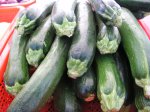 |
| Green zucchini |
that it was actually the same thing. Zucchini is squash and squash is zucchini! They are related to both the melon and the cucumber and come in many different varieties. Even though they can differ in shape, color, size and flavor, they all share one common characteristic – You can eat the entire vegetable, including its flesh, seeds and skin. For some squash plants the flowers they produce are also edible. The best squash are the summer variety. The zucchini is the narrow squash that looks like a cucumber in shape and can come in green or yellow in color and can actually have stripes or specks. The Crooked neck and straight neck squash generally have yellow skins. The natural state of this squash is crooked (swan like neck) while their straight neck cousin has been genetically engineered to lose the crooked neck shape. The Pattypan Squash looks like a saucer with wavy edges. This can come in green or a golden yellow. This is probably my favorite of the summer squashes because it’s a bit sweeter in flavor than the others. Squash is great sautéed, grilled and raw and especially delicious as bread! It’s filling, satisfying and really, really good for you.
 |
| Pattypan and Straight |
 |
| Crooked Neck |
Wild squash originated in an area between Guatemala and Mexico. It has been consumed for over 10,000 years now and was first cultivated for their seeds because early squash was bitter and didn’t have much flesh to eat. As time progressed, squash cultivation spread through the Americas and better varieties with sweeter tasting flesh were developed. Christopher Columbus brought squash back to Europe from the New World. Portuguese and Spanish explorers introduced their cultivation throughout the world. Today the largest commercial producers of squash include China, Japan, Romania, Turkey, Italy, Egypt and Argentina.
I was surprised not to find California on the list, with all the squash and zucchini varieties sold at the Farmers Market each week! Bon Appétit!
written by Autumn, 15 - El Camino High School

